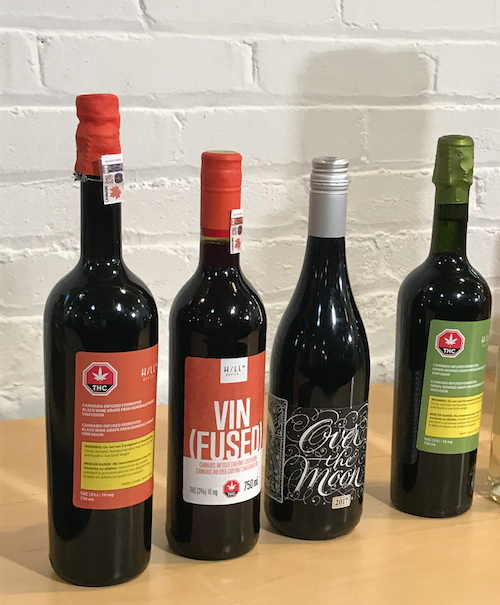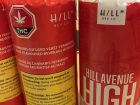
News
Producers speak out on proposed regulations for cannabis beverages
The Cannabis Beverage Producers Alliance (CBPA) officially launched on Wednesday at a press conference in Toronto, outlining its recommended guidelines for the imminent cannabis-infused beverage industry.
April 24, 2019 By Tamar Atik
 Mock-up cannabis-infused beer displayed at the Cannabis Beverage Producers Alliance launch.
Mock-up cannabis-infused beer displayed at the Cannabis Beverage Producers Alliance launch. Grow Opportunity was on location to hear first-hand what’s in store for the cannabis beverage market pending legalization later in 2019.
The group, led by former Nova Scotia premier Darrell Dexter, is a not-for-profit advocating for consumer- and industry-friendly regulations governing cannabis beverages.
CBPA is comprised of 10 companies from the alcoholic beverage and cannabis industries, including Hill Street Beverage Company, Lifford Cannabis Solutions, Province Brands of Canada, Truss Beverages, Cannabis Compliance Inc., CanBev (WeedMD and Phivida Holdings JV), Collective Arts Brewing, VinFirst Innovative Packaging, and Lakeside Process Controls.
The CBPA is requesting Health Canada’s support in establishing production, packaging and distribution guidelines for the cannabis-infused beverage industry ahead of final regulations being set for Canadian consumers. Health Canada published the draft regulations for edibles containing cannabis extracts and topicals in December 2018.
“In transferring our knowledge of how Canadian consumers engage with highly regulated products like dried cannabis flower and beverage alcohol, the alliance is committed to working with Health Canada to strictly regulate cannabis beverages to ensure public safety and encourage responsible and safe consumption, and to mitigate risk,” Dexter said.
According to Deloitte’s 2018 report on the cannabis industry, 31 per cent of potential consumers are interested in trying cannabis beverages.
In speaking about marketing and branding messaging for cannabis-infused beverages, Hill Street Beverage Company’s chief executive Terry Donnelly said cannabis beverages should be clearly labelled for consumers.
“We believe that using terms such as wine and beer allows for familiar brands and terminology from the beverage alcohol sector to ensure Canadian consumers can connect the quality and repetition of a specific brand and product that they would purchase and then consume as a cannabis beverage,” Donnelly said.
 Current proposed regulations mandate that terms such as fermented grape juice or fermented extract of cereal grains will replace wine or beer, which Donnelly said will be confusing to consumers. “The removal of the alcohol from the finished wine and beer output still allows for the remaining to be structurally defined and legally described as a wine or a beer,” he said.
Current proposed regulations mandate that terms such as fermented grape juice or fermented extract of cereal grains will replace wine or beer, which Donnelly said will be confusing to consumers. “The removal of the alcohol from the finished wine and beer output still allows for the remaining to be structurally defined and legally described as a wine or a beer,” he said.
“The multiple labelling and packing requirements will be sufficient to ensure consumers understand that they are buying a cannabis product and that there is no alcohol in that beverage,” Donnelly said. “Any prohibition on using a familiar brand in association with a product would appear to overreach the original intention of the regulations.”
A separate building regulation also mandates that all licensed cannabis producers that currently have conventional food and beverage products must have a separate facility to manufacture or process cannabis-infused products.
“This is a significant barrier to entry for the marketplace, particularly for small and mid-size producers and it’s going to potentially lead to a monopolized environment of the large macro producers,” said Paddy Finnegan, business unit manager for food and beverage at Lakeside Process Controls.
He added the extra cost for small to mid-size producers will make it difficult to compete with the illicit market.
Finnegan said the CBPA would like to engage with Health Canada to test cannabis-infused products to make sure they contain the appropriate strains and concentrations, and also test both conventional and infused products to ensure there’s no cross-contamination.
Lisa Campbell, chief executive officer of Lifford Cannabis Solutions and co-chair of the CBPA alliance, spoke about parity with alcohol for both packaging and labelling. She demonstrated with a cork and cage cap that using that type of seal on cannabis beverages will prevent children from accidentally opening bottles. She said these packaging solutions ensure consumer safety in compliance with Health Canada regulations, adding that the CPBA is “not reinventing the wheel.”
Mock-ups of proposed packaging and compliant packaging were on display to show what consumers might see on shelves in the near future. June Nicholson, executive vice-president of partnerships and government affairs at Hill Street Beverage Company and co-chair of the CPBA, held up two cans of beer, one conventional and one infused, to show how cannabis-infused products won’t be branded as creatively to ensure consumers know what they are purchasing.
The CBPA said Health Canada is currently reviewing approximately 7,000 submissions received during a public consultation period around how edible products will be regulated.
Print this page




